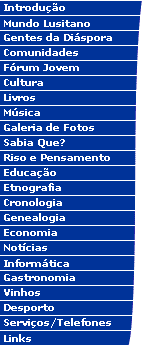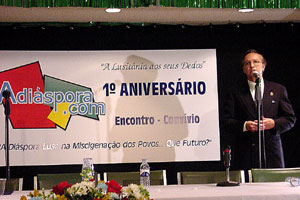




|
"... I would just like to refer to the gentleman at the end. (referindo-se ao último interveniente do painel de jovens) He made a very good point - that it's so important that our organizations, our clubs, recognize the fact they are very proud (referência aos jovens luso-canadianos), that they are very interested in participating in the Portuguese community, whether they live in a region where Portuguese is not as common, or whether their parents spoke English at home, which is fine - My wife speaks only English so I spoke English with my children and all my children are in the same position as they. They went to Saturday school to learn Portuguese. They have learned Portuguese since they were infants. They went to Saturday school throughout their high school years. It is very important that even though they are not fluent in Portuguese, they be able to feel welcome in our activities, in the community, because they have a lot to give whether they speak in English or Portuguese. Everybody in the Portuguese community now is able to understand English and is able to communicate to a certain degree in English. Some people may have more difficulties than others but there is a clear understanding of the English language in the majority of people in our community. It's so important to have these youngsters because they are part of our community. They are people who will help us network with other organizations, in the business world and in other communities. Ontario is made up exactly of communities such as this. As I travel throughout Ontario, as I go to other communities I am often called a Canadian. If I go to a Ukrainian or a Polish community, then they will refer to me a Canadian - in the exact same way we refer to people from other communities as Canadians, - and often as Portuguese. We are Luso-Canadians. We are Portuguese Canadians, Canadians of Portuguese heritage. But we are fundamentally Canadians in this great country. What makes this country great is the fact that people can be Canadians and be so much in tune with their culture, the culture of their parents, or their original culture, the fact that they can have cultural celebrations, dances, folklore, festivities, religious activities and do that in the context of Canada. That is what makes this country truly great and the reason for people to come to Canada and stay here. So I think a very positive message has emerged from this group. I was also impressed to watch the seniors, the 55+ Group (referindo-se ao Grupo de Mulheres Portuguesas 55+ e ao projecto HATS) that presented a show here today. As Minister Responsible for Seniors, it was a good opportunity for me to see an outstanding group of seniors give us a wonderful performance. I hope to see them more often in the exercise of my portfolio. So, as Minister of Citizenship and Minister Responsible for Seniors
I just want again to thank all of you, thank the club, - this
club often makes its space available to cultural events - and
thank the organizers. This was a great opportunity. However, I
just want to ask all of you to focus on the future. This is our
community. We may be of Portuguese background but what we have
in common here is much more than our Portuguese heritage. What
we have in common here is what we have built in this province.
The name, the Portuguese name, our work ethic, the respect we
get everywhere I go in this province and in this country. So we
have a lot in common, a lot to be proud of and we have to look
at ways to widen our participation further in the sense of getting
together all people from all organizations and clubs. Someday,
it may be that we won't need 20, 30 or 40 different clubs. We'll
have a Centre. We can, for example, fundraise half a million dollars,
more than half a million dollars, almost a million dollars in
one night for a political event. Why can't we as a community fundraise
and then in partnership with the different levels of government
build Centres that would house all the community instead of having
it divided into so many clubs and organizations? We can do it
and that is what we have to start thinking about - looking forward
and having a wide spectrum of our activities in this province
and in this country. I'm quite sure we will achieve this and still
recognize the validity of these clubs, which are wonderful places.
They are places to which people have dedicated a lot of their
time and volunteer effort to put them together. They will continue
to be part of whatever this community becomes. But it would be
a great thing if we could have events such as this that will attract
the whole community in a place that will have other activities.
We have, for example, wonderful painters and artists in the community.
It would be nice to have a place that is central and where their
paintings will be on exhibit permanently. It would be great to
have music classes in a centre, aerobics, dancing - not only folklore
but other artistic performers - and training all in one center.
These are the things we have to think about as we move forward,
because we have the talent and we have a great community. We have
a good, sound foundation. All we have to do is look forward to
a very bright future… |

